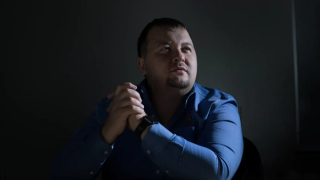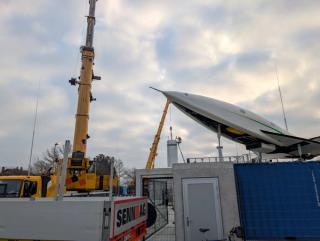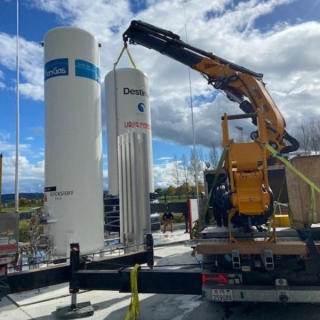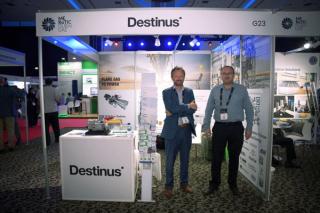The engines are set in motion and the dark vehicle starts moving along the runway. After a few meters, it takes off, then makes a few laps over the terrain. When the aircraft comes to a halt on the runway shortly after the landing approach, applause and cheers erupt: The maiden flight was a success.
What was announced in the skies on November 19, 2021, is soon to become Europe’s largest space start-up. Destinus is the name of the company, and it wants nothing less than to revolutionize air travel. The hyperplane, a hybrid between an airplane and a rocket, is planned to reach Australia in 90 minutes at 15 times the speed of sound, in a climate-neutral manner. This is expected to dramatically reduce delivery times for global air freight to 6-12 hours instead of the current 24-72, and at a comparable cost. The company’s development is proceeding at a similar pace: the airworthy prototype the size of a car was built in just three months, and the next one will be the size of a bus, ready for take-off in 2022. The first commercial intercontinental flights with a payload of one ton are planned for 2025, with a final stage of 100 tons across the globe by 2029. Thousands of hyperplanes and 1000 employees are expected to be in operation by then – Destinus currently has 60 employees. “I used to herd sheep as a teenager, on a motorcycle or horseback,” says company founder Mikhail Kokorich, explaining the horrendous speed: “If you want to drive the sheep through the forest, you have to get them to top speed. If you go too slow, they get lost in all directions. It’s similar with highly qualified and motivated employees.”
ENGINEERING PHYSICS
Kokorich has a very unusual life story to tell: The 45-year-old grew up in a simple country house without running water or a toilet in Siberia near the Mongolian border (which is seen in his facial features if you look closely). As a child, he won numerous prizes in mathematics, physics and chemistry, went to a renowned boarding school for gifted students in Novosibirsk, and began studying physics at the age of 16. At age 19, he founded his first company, which soon became the largest supplier of mine explosives in Siberia. He then set up a chain of stores selling household goods, he was the head of a woodworking company and the third-largest electronics retail chain in Russia. In 2011, Kokorich returned to what interests him most, mathematics and physics: he founded Dauria, the first private space company in Russia. Most importantly, he used his fortune to support the Russian opposition and became involved with Mikhail Khodorkovsky’s Open Russia movement. As expected, the Putin government did not take this well: Dauria was accused of financial irregularities by the authorities and the company eventually had to close down.
USELESS PATENTS
Because of mounting pressure, Kokorich emigrated to the U.S. in 2014 on a high-end visa: “I’m a typical representative of the Putin exodus,” he says. In California, he founded other space companies: Astro Digital, which analyzes and distributes satellite data; its main customer was the U.S. Department of Defense. And Momentus, a shuttle service for satellites to move them between different orbits, with a revolutionary propulsion system based only on water and sunlight. More than $100 million in venture capital was raised by Momentus, and the company was valued at $4 billion. But under the Trump administration, tensions with Russia intensified; Kokorich, as the founder, chief executive officer, and majority shareholder of companies with national security significance, came under pressure from authorities. Startup permits were denied, the SEC securities regulator opened a case, and in the end he had to sell his shares for a symbolic price.
At the beginning of 2021, Kokorich therefore decided to leave the U.S. and move to Europe. He already knew Switzerland from previous visits; but the decisive criteria for choosing the location were cultural proximity, access to highly qualified employees, quality of life, central location and political security: “There aren’t many places where I can realize my dream,” he says. Conny Boersch of Mountain Partners – one of the investors of Momentus – opened the doors for him in Switzerland, procuring a lawyer, tax advisor and house on Lake Geneva: “We put together the all-round carefree package for him,” says the VC. Innovaud President Rémi Walbaum, who knew Kokorich from Stanford University, finally placed him in the Technopôle at the Payerne airfield.
There, Kokorich first has to solve major technical challenges: For takeoff and landing, the Hyperplane uses aircraft engines that are powered by liquid hydrogen – a type of engine that doesn’t exist today. The first prototype of the engine should be ready in the next few months. After reaching the speed of sound, the rocket engine will then ignite at an altitude of 20 kilometers, taking the Hyperplane at Mach 15 into the mesosphere at an altitude of 60 kilometers. Hydrogen is also used as the propellant for this – unlike Elon Musk’s SpaceX rockets, for example, which are fueled with conventional methane that emit huge amounts of CO2 in the process. It must be possible to reuse the flight vehicle thousands of times over, and an active cooling system is needed for the envelope because of the extreme heat generated when it sinks into the lower layers of the Earth’s atmosphere. In Switzerland, supersonic flights are not feasible anyway; because of the sonic boom. Kokorich sees small airports in sparsely populated areas or by the sea, such as in Scandinavia or Spain, with access to cheap renewable energy for hydrogen production, as ideal launch pads (“hyperports”). Kokorich describes the technical challenges as “difficult, but feasible.” A handful of patents for them are already in the application process, with 10 to 20 to be added in the new year, although he says, “Most of the patents are useless in our industry. In reality, we just use any good technology, even if we can’t license it. If we get sued, then we just pay for it.”
Kokorich doesn’t want to work with the big players like Boeing, Airbus, Dassault or Rolls-Royce: “They would just swallow all our money without delivering anything.” But he poaches good people from them and pays generous salaries in return. Destinus has already set up subsidiaries in Munich, Madrid and Toulouse, the European hotspots of the industry. All of this is costly, and the capital requirements are immense: Kokorich estimates that he will need more than a billion francs before Destinus is profitable. The first financing round of eleven million this spring was completed in one afternoon, and the investors – most of whom knew Kokorich from his previous companies – only needed a few presentation slides. 100 million was the valuation, extremely high for a pre-seed round. “Kokorich is very confident about that,” Boersch says. The next round in the coming weeks is expected to bring in 25 million, and even after that the founder will hold a clear majority in the young company. “It’s much easier to raise money for Destinus than for my previous companies,” he says. After all, he says, “air freight – unlike space travel – is a real market: it’s $60 billion for express shipments alone, with regular air freight comprising another $100 billion, and both sectors are growing strongly. It’s quite possible that one day passenger aviation will be added to the list, with more than $600 billion”. In the long term, Kokorich is talking about a “trillion dollar business”.
It’s a huge bet that Kokorich is making, with enormous potential and unclear chances of success. In order to improve the chances bit by bit, Destinus is upgrading its personnel: In addition to Boersch, Philipp Rösler, the former German vice chancellor and WEF board member, is to join the board. Internally, too, Destinus is now adopting professional structures and tools. Kokorich himself will retain his freedoms: “I can’t be the good Swiss,” he says. “I must and always will be the crazy Siberian.”






